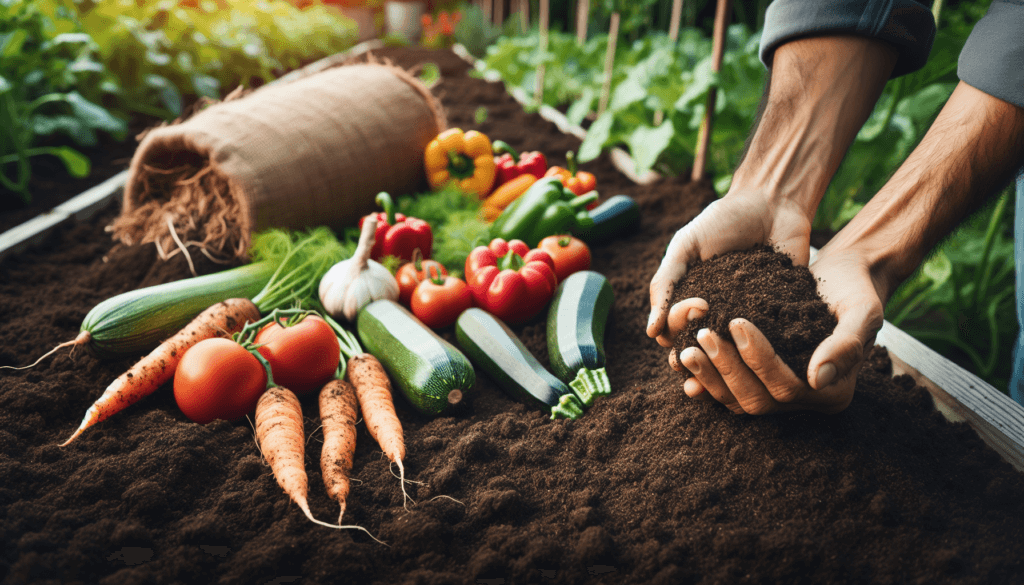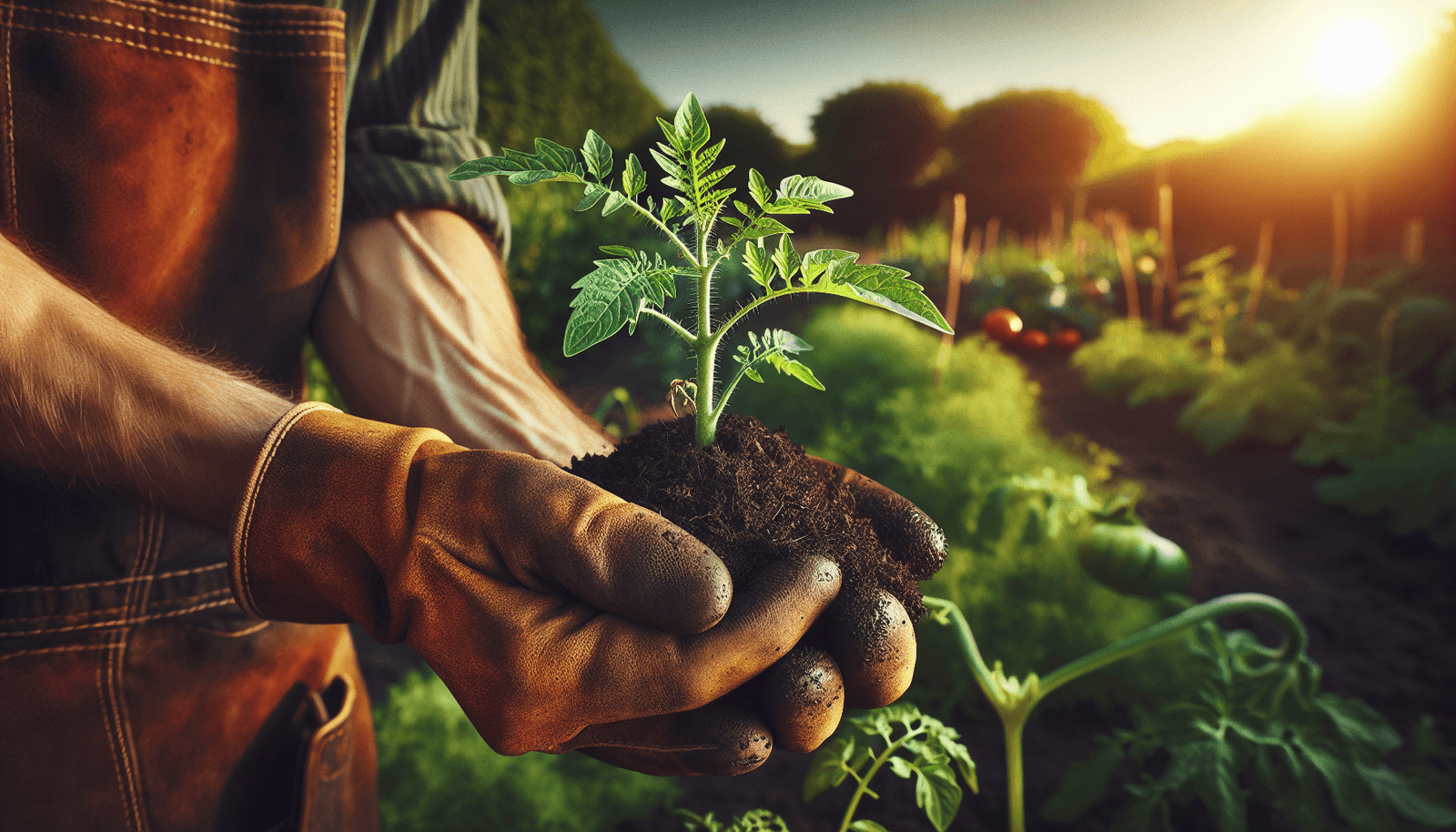Are you a passionate gardener, eager to grow your own organic vegetables but not sure where to start? Look no further! In this article, we will explore the world of organic vegetable gardening fertilizer. Discover the benefits of using organic fertilizers, learn about different types of fertilizers, and uncover tips and tricks to help you achieve a thriving and sustainable garden. Get ready to transform your garden into a haven of nutrient-rich, healthy vegetables that your family will love!

Choosing the Right Organic Fertilizer
When it comes to organic gardening, choosing the right fertilizer is essential for the health and productivity of your vegetable plants. Organic fertilizers offer a multitude of benefits compared to synthetic alternatives. They are derived from natural sources and provide your plants with the nutrients they need without harmful chemicals or pollutants. In this article, we will explore the benefits of organic fertilizers, discuss the different types available, delve into nutrient requirements for vegetable plants, and provide tips for using organic fertilizers effectively. By the end, you’ll be equipped with the knowledge to make informed decisions for your organic vegetable garden.
Benefits of Organic Fertilizers
The use of organic fertilizers in vegetable gardening offers several significant advantages. One of the main benefits is their ability to improve soil health and structure. Organic fertilizers contain organic matter that helps retain moisture, enhance soil aeration, and promote beneficial microbial activity. This, in turn, leads to healthier roots, stronger plants, and increased nutrient uptake.
An additional advantage of organic fertilizers is their environmental friendliness. Unlike synthetic fertilizers which can leach into water sources and harm ecosystems, organic fertilizers are derived from natural sources, reducing the risk of pollution. They are also biodegradable and contribute to the overall sustainability of your garden.
Organic fertilizers also have a long-term impact on soil fertility. They provide slow-release nutrients, ensuring a steady supply of essential elements for your plants over an extended period. This gradual nutrient release minimizes the risk of nutrient leaching and helps maintain a balanced and healthy soil ecosystem.
Types of Organic Fertilizers
There are various types of organic fertilizers available, each with its own nutrient composition and benefits. Understanding these options can help you make informed decisions about which fertilizer is best for your specific needs.
-
Compost: Compost is one of the most popular organic fertilizers and is made by decomposing organic materials such as kitchen scraps, leaves, and yard waste. It is rich in nutrients, improves soil structure, and enhances water retention.
-
Manure: Animal manure, such as cow, horse, or poultry manure, is a nutrient-rich organic fertilizer. It releases nutrients slowly and improves soil quality. However, it’s important to properly compost manure before applying it to the garden to reduce the risk of pathogens.
-
Bone Meal: Made from ground animal bones, bone meal is an excellent source of phosphorus, which is essential for root development and flowering. It is particularly beneficial for flowering plants and can help improve bloom quality.
-
Fish Emulsion: Derived from fish waste and solubilized into a liquid form, fish emulsion is rich in nitrogen, phosphorus, and potassium. It is a fast-acting fertilizer that provides immediate nutrients to plants, promoting leafy growth and overall plant vigor.
-
Blood Meal: Blood meal is a dry, powdered fertilizer made from dried animal blood. It is high in nitrogen and is ideal for promoting green growth and stimulating early plant development. However, it should be used sparingly to avoid nitrogen burn.
Considerations for Selecting Organic Fertilizers
When selecting an organic fertilizer for your vegetable garden, there are a few considerations to keep in mind. First, it’s important to understand the specific nutrient requirements of your plants. Different vegetables have varying nutrient needs, so choose a fertilizer that matches those requirements.
Additionally, consider the nutrient balance provided by the fertilizer. Macronutrients, such as nitrogen (N), phosphorus (P), and potassium (K), are required in larger quantities, while micronutrients, such as iron (Fe), manganese (Mn), and zinc (Zn), are needed in smaller amounts. Look for fertilizers that provide a balanced mix of both macronutrients and micronutrients.
Another factor to consider is the release rate of the fertilizer. Some organic fertilizers release nutrients slowly over time, while others provide an immediate boost. If you’re looking for long-lasting results, choose a slow-release fertilizer. If you need quick results, opt for a fast-acting fertilizer.
Lastly, take into account the soil pH of your garden. Some organic fertilizers can have an impact on soil pH, so it’s important to consider the pH requirements of your plants. Conduct a soil test to determine the pH level and choose a fertilizer that aligns with those needs.

Understanding Nutrient Requirements
To ensure the optimal growth and productivity of your vegetable plants, it’s crucial to understand their nutrient requirements. While each plant has specific needs, there are some essential nutrients that are universally necessary for vegetable plants.
-
Nitrogen (N): Nitrogen is vital for leafy green growth and overall plant vigor. It plays a crucial role in chlorophyll production, which is responsible for photosynthesis. Without sufficient nitrogen, plants may exhibit stunted growth and yellowing leaves.
-
Phosphorus (P): Phosphorus is essential for root development, fruiting, and flowering. It aids in energy transfer within the plant and contributes to the formation of DNA and proteins. Inadequate phosphorus can lead to weak roots, poor flower production, and reduced fruiting.
-
Potassium (K): Potassium helps regulate water and nutrient uptake, enhances disease resistance, and promotes overall plant health. It is vital for the development of strong stems and the production of high-quality fruits and vegetables.
In addition to these macronutrients, vegetable plants also require various micronutrients, such as iron, manganese, copper, and zinc. While these micronutrients are required in smaller quantities, they are equally important for overall plant health and productivity.
Determining the nutrient levels in your soil is crucial to adequately meet your vegetable plants’ requirements. Conduct a soil test to assess the levels of macronutrients and micronutrients and to identify any deficiencies or imbalances. This will help you select the appropriate organic fertilizer and make any necessary amendments to your soil.
Common Organic Fertilizers
Now that we understand the nutrient requirements of vegetable plants, let’s explore some common organic fertilizers that can help meet those needs. These fertilizers are readily available, effective, and safe to use in an organic vegetable garden.
-
Compost: Compost is a versatile organic fertilizer that provides a rich source of essential nutrients. It improves soil structure, enhances water retention, and promotes the growth of beneficial microorganisms. Simply spread a layer of compost around your plants and work it into the soil.
-
Manure: Well-aged animal manure is an excellent source of organic matter and nutrients. It releases nutrients slowly and improves soil fertility. Apply manure to your garden in the fall or early spring and thoroughly incorporate it into the soil.
-
Bone Meal: Bone meal is a slow-release phosphorus fertilizer that promotes root development and flowering. Sprinkle bone meal around the base of your plants during the planting process, ensuring it is in contact with the roots.
-
Fish Emulsion: Fish emulsion is a liquid fertilizer that provides a quick boost of nutrients, particularly nitrogen. Dilute it according to package instructions and apply it as a foliar spray or directly to the soil around your plants.
-
Blood Meal: Blood meal is a potent source of nitrogen that stimulates early plant growth. Use it sparingly and mix it into the top few inches of soil or apply it as a side dressing around your plants.
These organic fertilizers are readily available at garden centers or can be created at home. Experiment with different types to determine which works best for your garden and specific plant needs.
Tips for Using Organic Fertilizers
Using organic fertilizers effectively requires careful attention to timing, dosage, nutrient balance, and soil incorporation. Here are some tips to help you make the most of your organic fertilizers and maximize your vegetable garden’s potential:
Timing of Application
Timing is key when applying organic fertilizers. It’s best to apply fertilizers before planting or during the early stages of plant growth. This allows the plants to establish themselves and develop a strong root system before nutrient demands increase.
Proper Dosage
Follow the recommended dosage instructions provided on the fertilizer packaging. Over-fertilization can lead to nutrient imbalances, nutrient burn, or damage to plant roots. Start with a smaller amount and gradually increase the dosage if necessary.
Avoiding Nutrient Imbalances
Ensure your plants receive a balanced supply of macronutrients and micronutrients. If using a single organic fertilizer, consider supplementing with micronutrient-rich amendments or organic meals to ensure a comprehensive nutrient supply.
Incorporating Fertilizer into the Soil
Properly incorporate organic fertilizers into the soil to ensure even distribution of nutrients and to prevent them from being washed away by irrigation or rainfall. Rake or mix the fertilizers into the soil surface, taking care not to disturb the plant roots.
Mulching to Retain Nutrients
Apply a layer of organic mulch around your plants to help retain moisture, regulate soil temperature, and slow down nutrient release. Organic mulches, such as straw, leaves, or wood chips, gradually break down, releasing nutrients into the soil.
DIY Organic Fertilizers
If you prefer a hands-on approach, there are several DIY organic fertilizers you can create at home. These homemade options are cost-effective and provide nutrients for your vegetable plants in a sustainable manner. Here are a few popular DIY organic fertilizers:
-
Homemade Compost: Create your own compost using kitchen scraps, yard waste, and leaves. Composting not only reduces waste but also produces a nutrient-rich organic fertilizer that nourishes your plants and improves soil health.
-
Epsom Salt Solution: Dissolve Epsom salt (magnesium sulfate) in water and use it as a foliar spray or soil drench. Epsom salt supplies magnesium and sulfur, which are vital nutrients for plant growth.
-
Banana Peel Tea: Soak banana peels in water for a few days to create a nutrient-rich tea. Use the banana peel tea as a liquid fertilizer by applying it to your plants’ leaves or directly to the soil.
-
Coffee Grounds: Save and reuse your coffee grounds as an organic fertilizer. Simply sprinkle coffee grounds around your plants or work them into the soil. Coffee grounds provide nitrogen and organic matter to the soil.
These DIY organic fertilizers offer a sustainable and cost-effective alternative to store-bought options. Experiment with them to find the right mix for your plants and garden.
Benefits of Organic Vegetable Gardening Fertilizers
Organic fertilizers offer numerous benefits to both your plants and the environment. By opting for organic fertilizers in your vegetable garden, you can enjoy the following advantages:
Environmental Friendliness
Organic fertilizers are derived from natural sources and are less likely to harm the environment compared to synthetic fertilizers. They contain fewer harmful chemicals and reduce the risk of water pollution. They contribute to the overall sustainability and health of your garden ecosystem.
Improving Soil Health
Organic fertilizers enrich the soil by increasing organic matter content, improving soil structure, and enhancing water retention. They promote beneficial microbial activity, leading to a healthier and more balanced soil ecosystem. Over time, organic fertilizers can help rejuvenate depleted or unhealthy soil.
Safer for Human Health
Unlike synthetic fertilizers, organic fertilizers pose minimal risks to human health. They do not contain harmful chemicals or toxins that can be absorbed by plants and ingested by humans. By using organic fertilizers, you can grow and enjoy safe, healthy vegetables without worrying about chemical residues.
Enhancing Plant Growth and Yield
Organic fertilizers provide a balanced and slow-release supply of nutrients to your plants, leading to healthier growth and increased yields. The gradual release of nutrients minimizes the risk of nutrient imbalances and ensures a sustained nutrient supply over an extended period.
By choosing organic fertilizers for your vegetable garden, you not only reap the rewards of healthier and more productive plants but also contribute to a greener and more sustainable environment.
Common Pitfalls to Avoid
While organic fertilizers offer many benefits, it’s important to be aware of common pitfalls to avoid in order to achieve optimal results in your garden. Here are some things to watch out for:
Overfertilization
Too much of a good thing can be harmful. Overapplication of organic fertilizers can lead to nutrient imbalances, burning of plant roots, or excessive vegetative growth with reduced flowering or fruiting. Follow recommended dosages and monitor your plants for any signs of overfertilization.
Using Non-Organic or Synthetic Fertilizers
To maintain the integrity of your organic garden, it’s essential to avoid using non-organic or synthetic fertilizers. These products contain chemical compounds that can interfere with organic practices and harm beneficial soil organisms.
Ignoring Soil Testing
Conducting regular soil tests is crucial for understanding your soil’s nutrient levels and pH. Ignoring soil testing can lead to inadequate nutrient supply or imbalances, resulting in poor plant health and reduced yields. Take the time to understand your soil’s needs and make the necessary amendments accordingly.
Incorrect Application Methods
Improperly applying organic fertilizers can limit their effectiveness. Whether it’s applying too close to plant roots, not incorporating into the soil, or failing to follow the recommended application rates, it’s important to pay attention to the proper application methods for each fertilizer type.
By being aware of these common pitfalls and taking the necessary precautions, you can avoid potential issues and maximize the benefits of organic fertilizers in your vegetable garden.
Storage and Safety Measures
Proper storage and handling of organic fertilizers are vital to ensure their longevity and to protect yourself and the environment. Here are some guidelines to follow:
Proper Storage of Organic Fertilizers
Store organic fertilizers in a cool, dry, and well-ventilated area. Keep them away from direct sunlight, extreme temperatures, and moisture. Properly seal the containers to prevent moisture absorption and keep them out of reach of children or pets.
Protective Gear and Handling Precautions
When handling organic fertilizers, it’s wise to wear gloves and protective clothing to avoid skin irritation. Follow safety instructions provided on the fertilizer packaging, such as avoiding inhalation of dust or ingestion. Clean any spills or residues promptly and dispose of them according to local regulations.
By taking these storage and safety measures, you can ensure the effectiveness and longevity of your organic fertilizers while minimizing any potential risks.
Frequently Asked Questions
To conclude this comprehensive guide to organic fertilizers for vegetable gardening, let’s address some frequently asked questions:
How often should organic fertilizer be applied?
The frequency of organic fertilizer application depends on various factors, including the specific fertilizer, plant requirements, and soil conditions. Generally, organic fertilizers are applied at the beginning of the growing season and supplemented every four to six weeks during the active growth period. However, always refer to the specific instructions provided by the fertilizer manufacturer for the best results.
Can organic fertilizers negatively impact soil pH?
Some organic fertilizers can have an impact on soil pH, especially if used excessively or over a long period. For example, manure-based fertilizers tend to be alkaline and can raise the soil pH. It’s essential to conduct regular soil tests to monitor pH levels and make any necessary adjustments to maintain the optimal pH range for your plants.
Can I use fresh manure as a fertilizer?
Fresh manure is not recommended as a fertilizer due to the risk of pathogen contamination and nutrient imbalances. It’s crucial to compost manure before applying it to your garden to reduce the risk of transmitting harmful bacteria and to allow for the breakdown of excess nutrients. Well-aged or composted manure is a safer option.
What are the alternative sources of organic nutrients for veggie gardens?
In addition to organic fertilizers, you can incorporate other organic nutrient sources in your vegetable garden. Consider using natural amendments such as alfalfa meal, kelp powder, fish meal, or worm castings. These organic materials provide essential nutrients and can contribute to the overall health and productivity of your vegetable plants.
By taking into consideration these frequently asked questions, you can make informed decisions about the use of organic fertilizers in your vegetable garden.
In conclusion, choosing the right organic fertilizer is essential for organic vegetable gardening success. Consider the benefits of organic fertilizers, understand the nutrient requirements of your plants, explore the various types of fertilizers available, and follow best practices for usage. By incorporating organic fertilizers into your gardening routine, you can create a sustainable and thriving vegetable garden that produces healthy and nutritious crops while being in harmony with the environment.


